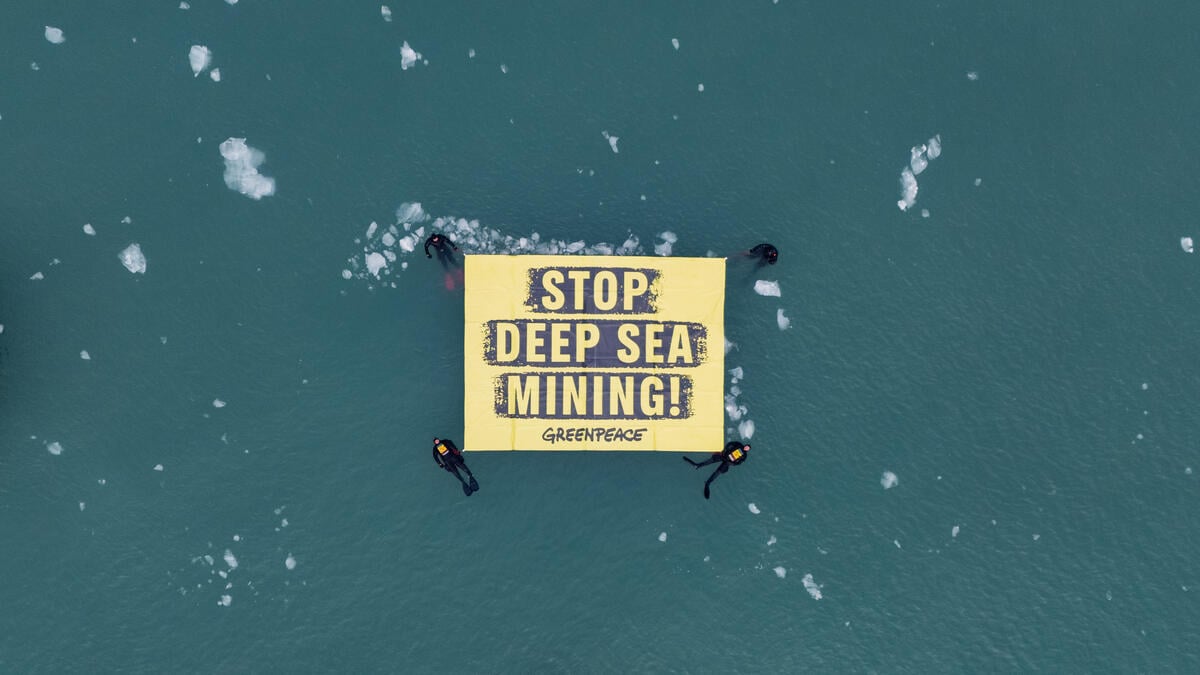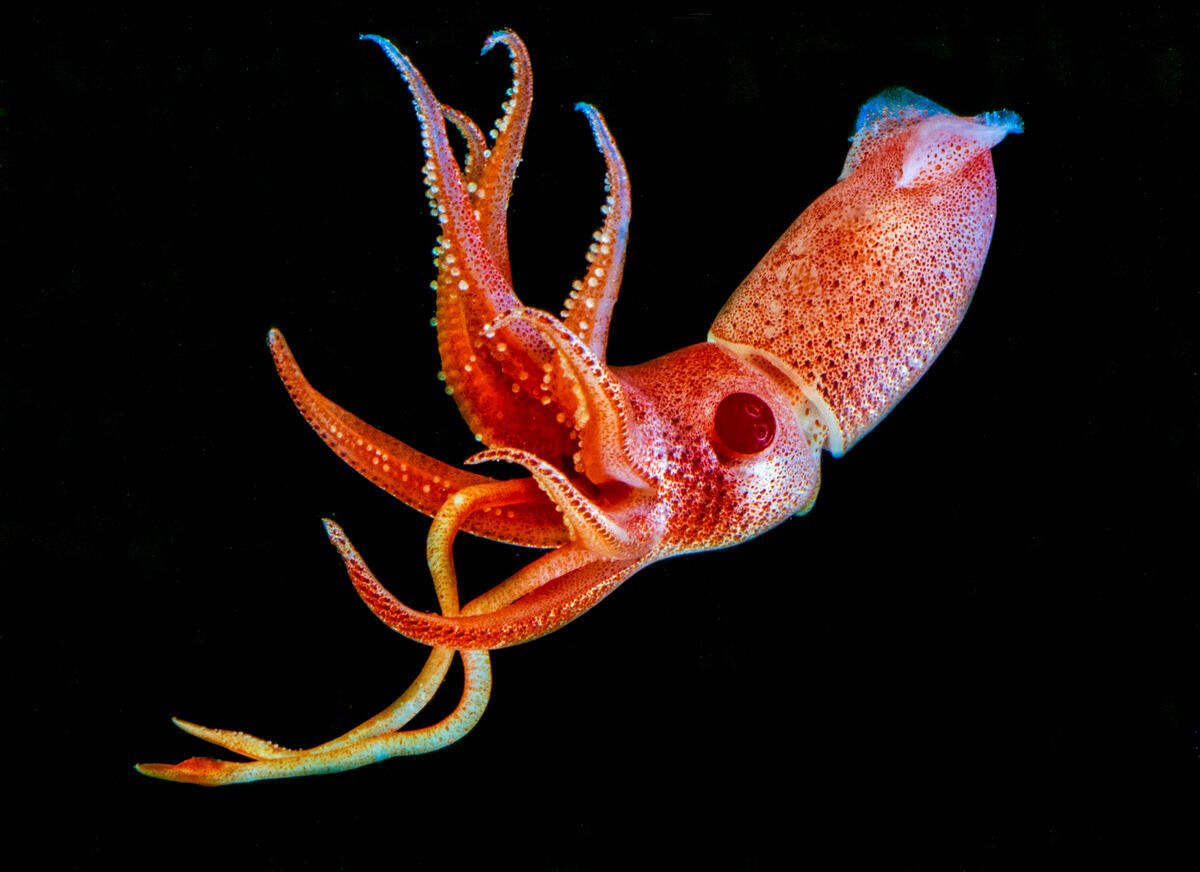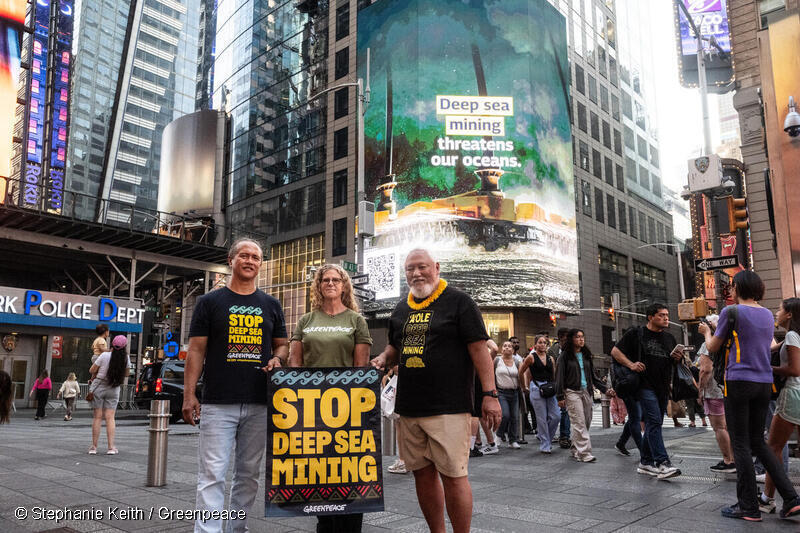
Miami, Florida (November 14, 2024)– On November 7, Greenpeace USA led a peaceful protest at the Deep Sea Mining Summit 2024 in Miami. The event, billed as the largest deep-sea mining investment gathering, was attended by a small group of approximately 20 persons and featured companies like Impossible Metals seeking investors. Jackie Dragon, the Greenpeace USA senior oceans campaigner who attended the event wearing a “Stop Deep Sea Mining” t-shirt entered the conference and addressed participants informing them of the risk of deep sea mining. Successive rounds of recordings of voices from around the world delivered a direct message to the industry proponents and would-be investors that “The World is Watching,” and 32 countries have called for a moratorium, pause, or ban on the destructive industry.
Despite claiming to welcome civil society, the event organizers employed misleading tactics to limit participation. Registrants received emails falsely stating the conference was canceled, and key details on timing and location were withheld. The efforts at exclusion were particularly egregious given the attendance by officials from the Bureau of Ocean Energy Management (BOEM), which has been leading the development of the US government’s approach to the nascent and controversial industry.
As organizers attempted to forcibly remove the activist, while continuing to deny they were hosting the deep sea mining summit, the activist also raised questions about the lack of transparency and attempts to thwart civil society inclusion.
Jackie Dragon said: “Deep sea mining proponents may claim that deep-sea mining and their technology is safe, but their refusal to allow public scrutiny raises serious doubts. Their tactics reveal an industry, much like Big Oil, that prefers to operate in the shadows while preparing to inflict irreversible harm on our common heritage—the deep seas and oceans that sustain us all. It’s unacceptable for them to engage in such deception while ignoring scientific warnings and growing global opposition to an industry that threatens the fate of our oceans and our planet. We will remain vigilant to ensure they don’t get the green light for the destruction they seek.”
Bobbi-Jo Dobush, Ocean Policy Consultant at Salt Horizon, LLC, said: “I registered for the Deep Sea Mining Summit, paid the fee, and then received no follow-up information from the organizers–not even the hotel details. After numerous calls, where I was repeatedly told no one was available to help, I finally received an email just two days before the conference, claiming it was canceled and promising a refund within weeks. I am appalled to learn that the event did occur and that the organizers appear to have explicitly and purposefully excluded civil society, scientists, and consultants like me.”
Mark Haver, Deep Rising Partnerships Manager, and Sustainable Ocean Alliance North America Regional Representative, said: “Per UN law, the deep seabed belongs to each and every one of us. Even though stewarding our common seabed is our legal right, the deep sea mining industry is divvying up what belongs to everyone behind closed doors, without our consent and without our participation. If the deep sea mining industry was legitimate or playing by the rules, then why would they lie? Civil society and researchers were told the event was canceled, but the Summit was not in fact canceled for industry representatives. The deep-sea mining industry wants to blindfold us while they destroy the common heritage of humankind, our seabed, and we must take their greediness and malpractice at face value for what it is: a ploy to mine the deep sea for the profit of a select few.”
The Dangers of Deep-Sea Mining
Deep sea mining poses significant risks to fragile marine ecosystems. Scientists warn that mining these areas could devastate vast sections of the ocean floor, disrupting habitats, marine biodiversity, and carbon cycles. Mining-related pollution, including toxic particles dumped into shallower waters, threatens marine life across the water column, endangering tuna fisheries that sustain many coastal communities.
Broad-Based Call for a Moratorium
Public opposition to deep-sea mining is increasing globally across various sectors. Thirty-two countries, including Canada, France, and the United Kingdom, along with numerous U.S. legislators, parliamentarians, civil society groups, and Pacific Indigenous communities, have called for a moratorium on deep-sea mining. Additionally, major businesses and insurers have pledged to avoid involvement in the industry.
Numerous studies highlight the economic and environmental costs associated with deep-sea mining. Planet Tracker warns that DSM could result in over $500 billion in value destruction, with habitat loss and natural capital destruction accounting for at least $465 billion. The Ocean Foundation has also questioned DSM’s financial viability, as next-generation battery technology reduces reliance on deep-sea metals.
Greenpeace USA is part of a global network of independent campaigning organizations that use peaceful protest and creative communication to expose global environmental problems and promote solutions that are essential to a green and peaceful future. Greenpeace USA is committed to transforming the country’s unjust social, environmental, and economic systems from the ground up to address the climate crisis, advance racial justice, and build an economy that puts people first. Learn more at www.greenpeace.org/usa.



